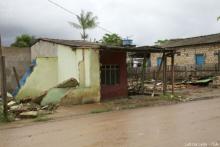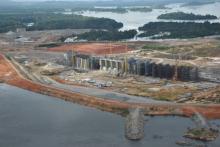Four years ago this month, the Inter-American Commission on Human Rights took an important step forward for the peoples of the Xingú River Basin. It requested that the Brazilian government adopt precautionary measures to prevent irreparable damage to the rights of indigenous communities along the Amazonian tributary. Their cultural integrity and way of life were, and still are, at risk from the construction of the world’s third-largest dam, Belo Monte.
Yet that major victory for those fighting to protect life on the Xingú has been diluted with time. As the decision weakened, so too did confidence in the Commission, an organ of the Organization of American States (OAS) charged with ensuring the protection of human rights on the continent.
The Initial Request
In November 2010, AIDA and partner organizations in Brazil requested precautionary measures from the Commission in a context of gravity and urgency characterized by:
- An irregular licensing process.
- An insufficient Environmental and Social Impact Assessment (ESIA), which contained neither all possible impacts nor the mitigation measures needed to guarantee the communities’ rights, and was not translated into the indigenous languages of the affected populations.
- The project’s failure to comply with more than 60 social, environmental and indigenous provisions established in the previous license as safeguards for the rights of the affected.
- Absence of consultation with affected indigenous communities and lack of their free, prior and informed consent.
In response, the Commission requested that Brazil immediately suspend construction and all licensing of the dam until the project complied with the following conditions:
- Undertake consultation processes that are of good faith and culturally appropriate, with the goal of achieving the free, prior, and informed consent of affected communities.
- Ensure that affected communities have access to the Environmental and Social Impact Statement in an understandable format, which includes translation into indigenous languages.
- Adopt measures to protect the cultural integrity and way of life of indigenous peoples, including those in voluntary isolation, and to prevent the spread of diseases and epidemics among affected communities.
The Response of Brazil and the OAS
The Brazilian Government rejected the measures, calling them "precipitous and unwarranted." In response, Brazil withdrew its envoy from the Commission and recalled its ambassador to the OAS. Then, claiming a need for economic austerity, Brazil suspended funding to the Commission and defaulted on its annual compulsory contribution to the OAS.
The outlook worsened when the Secretary General of the OAS, José Miguel Insulza, told the BBC: "The Commission makes recommendations. They are never mandatory orders… no country will be violating a treaty if they don’t do what the Commission asks. The Commission has no such binding force."
These undermining comments provided several hostile member States with justification for launching a process to "reform" the Inter-American Human Rights System. The controversial process lasted more than two years and, rather than strengthen the Commission, the hostile States actually attempted to undermine its autonomy and weaken its mechanisms.
One Step Back
On July 29, 2011, just four months after granting the precautionary measures, the Commission modified them. It withdrew its request for suspension of construction and licensing, claiming the fundamental argument had turned into a debate, which went beyond the scope of the precautionary measures, on whether prior consultation had been conducted with the indigenous communities and whether they had given their informed consent for the project. Instead, the Commission requested that Brazil adopt new measures to protect the way of life and personal and cultural integrity of indigenous peoples in voluntary isolation, as well as the health and territory of all affected indigenous communities.
 This change represented a major setback, not just for the indigenous communities of the Xingú, but also for the thousands of communities throughout the region whose cultural integrity and way of life are at risk from the heedless implementation of projects like Belo Monte. Brazil’s indigenous communities had hoped that the Commission would stand by its decision to suspend the dam, and would protect them while the case – presented in 2011 by AIDA and partner organizations from Brazil – was underway.
This change represented a major setback, not just for the indigenous communities of the Xingú, but also for the thousands of communities throughout the region whose cultural integrity and way of life are at risk from the heedless implementation of projects like Belo Monte. Brazil’s indigenous communities had hoped that the Commission would stand by its decision to suspend the dam, and would protect them while the case – presented in 2011 by AIDA and partner organizations from Brazil – was underway.
Up Against Time
After four years, Brazil has not only breached the precautionary measures, but has also repeatedly requested that they be lifted. Worse still, the government has allowed construction of the Belo Monte Dam to continue, and the project is now 70 percent complete.
A few months ago, the company in charge of construction, Norte Energia S.A., requested the dam’s operating license from the Brazilian Institute of Environment and Natural Resources. Once granted the license, they will begin to fill the dam’s reservoir and, with it, flood a portion of the Amazon half the size of Rio de Janeiro.

The Commission has yet to petition the Brazilian government to determine whether or not the project’s authorization included a process of prior consultation This important step remains despite the fact that, when modifying the precautionary measures, the Commission itself noted that the discussion had to happen in the context of a petition.
What’s the risk? When the Commission finally makes a decision on the case it may be too late to prevent damages to affected communities.
A Major Challenge
Although there has been some progress in protecting affected communities as a direct result of the precautionary measures, which the Brazilian government has yet to recognize officially, the process thus far has clearly demonstrated that the Inter-American Human Rights System is imperfect and vulnerable to political pressure.
This vulnerability must be overcome. We must focus on building a truly efficient System that works best for its beneficiaries: the victims of human rights abuses.
Four years after what seemed like an important victory, Belo Monte has taught us that if we seek to protect human rights in the region effectively, governments must not be allowed to jeopardize the system established for that purpose through political and economic pressure.
Due to the realities of the region, many cases like Belo Monte have come, and will continue to come, before the System. While they are not easy to resolve, we mustn’t choose inaction in the face of suffering.
In the case of Belo Monte, the Commission still has time to act.
It’s our hope that this case will become a model for equitable access to justice. At AIDA, we will continue working until we ensure that the environment and the rights of communities in Brazil’s Xingú River Basin are fully respected.
